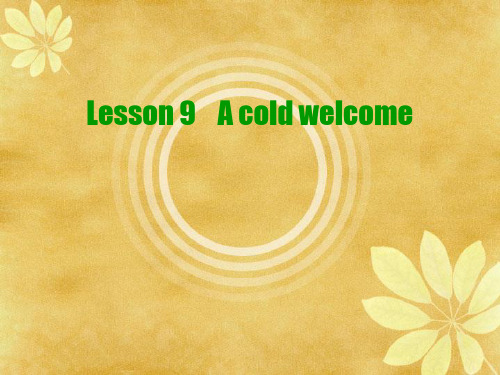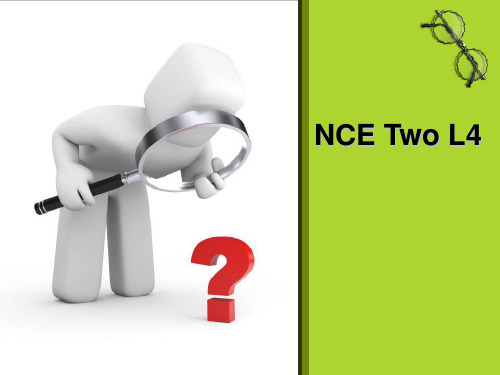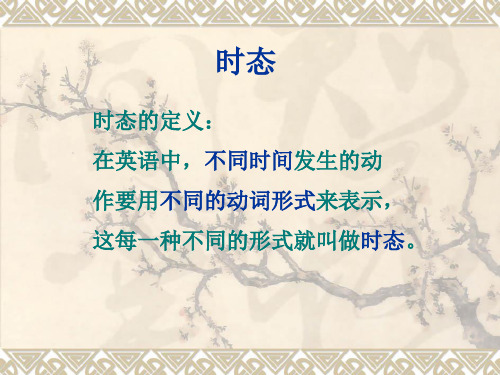新概念英语二册PPT课件
合集下载
新概念英语第二册课件Lesson11共27张PPT

off for back
1. Should I pay ___ the drinks? 2. We should be able to pay __ the
debt wiபைடு நூலகம்hin two years. 3. He will pay ____ the money in
monthly installment 4. Did your plan pay ___?
•. ………when Tony Steele………
Tony ………years ago, but he is now……..
He…….salary, but he………. friends and never……..
Tony saw…….and…..and……..
•He has never………
collect/pick up salary/wages
pay back [1]偿还,还钱给(某人);
EG: Will you lend me $10? I will pay you back next month. [2]回报 How can I pay you back for all your kindness? 我该怎样报答你的好意呢?
• The Ant and the Dove An ant is walking by the river. He looks at the river and says to himself, “How nice and cool this water looks! I must drink some of it.” But when he is drinking, he slips into the river. “Oh.Help!Help!” The ant cries, A dove is sitting in the tree. She hears him and throws him a leaf, “Climb up that leaf,” she says “and you will float bank.” The ant climbs onto the leaf, and the wind blows the leaf to the bank. And the ant is saved. “Thank you, Dove. You’re so kind,” The ant says and runs home, “You have saved my life, and I wish I could do something for you, Goodbye!” “Goodbye!” says the dove, “Be careful. Not to fall into the river again.” After a few days, the dove is building her nest. And a man is raising his gun to shoot her. The ant sees this, and runs quickly to bite the man’s leg. “Ouch! Ouch!” The man feels pained and drops his gun. The dove hears and flies away. So the man picks up his gun and leave. The dove comes to her nest. “Thank you, my little friend,” she says, “You have saved my life.” The little ant is so glad, because he can help the dove.
新概念英语第二册课件Lesson18共15页PPT

land 陆地;土地 lord 贵族;勋爵(包括公侯伯
子男)
3.bill /bil/ n. 帐单
• 1.议案;法案 • 2.纸币;钞票 • 3.广告;海报 常用搭配: foot the bill 付账;负责 pay/settle the bill 付账 fill the bill 适合
text
• 1、After I had had lunch at a village pub, I looked for my bag.
• Pub是public house(酒店,酒店) 的缩写
• Let’s go to the pub for a drink.
• 2、I had left it on a chair beside the door and now it wasn't there!
• leave除了“离去,离开,出发” 的意思,还可以表示“把(人、 物)留下,遗留,丢下”等。
还有许多其他事要做。 • beside pron. 在……旁边,在……附近 • besides adv. 而且,并且,此外;pron. 除……
之外(还)
• I’m quite busy today. Besides, I’ve got a bad cold.
• There were a lot of people at the party besides us.
Have的用法
• 1、have作为助动词构成各种完成时和完成 进行时
• 2、have还可以作完全动词,当作“具有、 拥有”讲时,它和have got通常可以互换。 have做 “有, 患病” 概念时, 可作为实义动 词, 也可作为非实义动词。在英国英语中的 疑问句和否定句中have(具有)的用法与 be相同,即可以不用助动词do或did;在美 国英语中,常用do助动词和have一起构成 疑问句和否定句。
子男)
3.bill /bil/ n. 帐单
• 1.议案;法案 • 2.纸币;钞票 • 3.广告;海报 常用搭配: foot the bill 付账;负责 pay/settle the bill 付账 fill the bill 适合
text
• 1、After I had had lunch at a village pub, I looked for my bag.
• Pub是public house(酒店,酒店) 的缩写
• Let’s go to the pub for a drink.
• 2、I had left it on a chair beside the door and now it wasn't there!
• leave除了“离去,离开,出发” 的意思,还可以表示“把(人、 物)留下,遗留,丢下”等。
还有许多其他事要做。 • beside pron. 在……旁边,在……附近 • besides adv. 而且,并且,此外;pron. 除……
之外(还)
• I’m quite busy today. Besides, I’ve got a bad cold.
• There were a lot of people at the party besides us.
Have的用法
• 1、have作为助动词构成各种完成时和完成 进行时
• 2、have还可以作完全动词,当作“具有、 拥有”讲时,它和have got通常可以互换。 have做 “有, 患病” 概念时, 可作为实义动 词, 也可作为非实义动词。在英国英语中的 疑问句和否定句中have(具有)的用法与 be相同,即可以不用助动词do或did;在美 国英语中,常用do助动词和have一起构成 疑问句和否定句。
新概念英语第二册lesson40课件共25张PPT

3. If I ______ you, I ______ more attention to English idioms
and phrases.
A. was; shall pay
B. am; will pay
C. would be; would pay D. were; would pay
4. —Alice, why didn’t you come yesterday? —I ______, but I had an unexpected visitor. A. had B. would C. was going to D. did
① v. 使……固定、安装 fix the picture on the wall She fixed a handle on the door. ② v. 修理 fix on使(目光、注意力等)集中于,盯着 fix one's eyes on sth./ one's eyes be fixed on sth.盯着……目不转睛 All the eyes were fixed on the blackboard.
2).If he had taken my advice,he would not have made such a mistake. 如果他听我的劝告的话,就不会犯这样的错误了。(事实:没有听我的话)
Exercises:
1. I don’t think that I shall fail. But if I ______, I would try again. A. should fail B. would fail
2.Mrs. Rumbold was a large, unsmiling lady in a tight black dress. unsmiling adj. 不笑的 unsmiling的反义词为 smiling 有些形容词前面可以加上前缀un-来表示相反的意义:
新概念英语第二册课件Lesson 9 (共21张PPT)

• 2. (眉等)皱起
• 3. 生脓,化脓 名词 n. 1. 聚集
• 2. 收获量
gather指人们聚 集在一起,尤指 自发性的聚集
• 3. 衣褶
• refuse
美音:[rɪ'fjuz]
• refuse 1 及物动词 vt. 1. 拒绝;拒受;拒给;不准[O1] He refused my offer of help. 他拒绝了我的帮助。
1st •表示具体时间 on Wednesday
evenday
•用at的时间短语:
•表示确切时间 at five to twelve •表示用餐时间 at lunchtime •表示具体时间 at night
• during 在···期间 • during the hoilday 强调假期从头到尾 • from ···till ··· 指一段明确的时间 • until 直到 • until的主句和从句两个都用一般过去时(
refuse sb\sth refuse to do
•welcome 美音:['wɛlkəm]
• welcome sb to+地点 • a warm welcome 热烈的欢迎 • You are welcome to+地点
• strike
美音:[straɪk]
• v:打,击,弹,敲···(钟,乐器···)
• 5. 猜想,推测+(that) I gather that he is the one in charge. 我猜想他是负责的人。
• 6. 使皱起
She gathered her brows into a frown. 她皱起了眉。
• 不及物动词 vi. 1. 积聚;集合
新概念英语第二册第一课-PPT

business [ˈbɪznɪs]
n. 事
rude rudely
[ruːd] [ˈruːdli]
adj. 粗鲁的 adv. 粗鲁地
1、What did the writer do last week? 2、Why couldn't the writer enjoy the play?
Last week I went to the theatre.I had a very good seat.The play was very interesting.I did not enjoy it.A young man and a young woman were sitting behind me.They were talking loudly.I got very angry.I could not hear the actors.I turned round.
一般过去时的否定句:主语+didn’t + v原形+ 其它 主语+wasn’t/ weren’t+其它
过去进行时
A young man and a young woman
were sitting behind me.
They were talking loudly. 过去进行时:表示过去某一特定时刻正在进行的 动作。 与现在进行时相比,过去进行时的区别就在于要 用be的过去式。 主语+was/were+动词ing .
get angry 系表结构,生气
be angry with sb. 表生气的状态
get angry with sb. 表生气的过程
I could not hear the actors.
新概念第二册 PPT 课件

旅游英语
将课程内容与旅游场景相 结合,教授学生在旅游过 程中如何运用英语进行沟 通和表达。
课程实践活动的组织与实施
小组讨论
组织学生进行小组讨论,培养学 生的团队协作和沟通能力,提高 学生的口语表达和听力理解能力
。
角色扮演
组织学生进行角色扮演活动,模拟 真实场景中的对话和交流,培养学 生的口语表达和听力理解能力。
倒装句。
03
课程实践与应用
听说读写各项技能训练
听力训练
通过播放英语音频材料,训练 学生的英语听力理解能力,提 高语音识别和信息捕捉能力。
口语训练
通过模拟真实场景的对话练习 ,培养学生的英语口语表达能 力,增强自信心和沟通技巧。
阅读训练
通过阅读英文文章和短篇小说 ,提高学生的阅读理解能力和 词汇量,培养阅读兴趣和习惯 。
03
和英语能力,以便更好地引导学生学习。
如何根据学生需求选择合适的教材
了解学生需求
在选择教材之前,教师应了解学生的 学习目标、英语水平、兴趣爱好等,
以便选择最适合学生的教材。
考虑学生的实际生活经验和背景,选 择更贴近学生需求的教材。
比较不同教材的特点
教师应对各种教材进行比较,了解其 特点、难度、教学方法等,以便为学 生选择最适合的教材。
教学内容:都涵盖了语法、词汇、阅读、听力等语言学习的各个方面。
与其他教材的异同点分析
• 教学方法:都采用了多种教学方法,如任务型教学、情景 教学等。
与其他教材的异同点分析
01
不同点
02
教材内容:新概念第二册与其他教材在内容上有所不同,新概念第二 册更注重实际应用,话题更贴近生活。
03
难度:新概念第二册的难度相对于其他教材略高,语法点和词汇量更 大。
新概念英语第二册课件Lesson19共58页PPT

I said.
• “也许已经开演了呢,”苏珊回答 说。
• 'It may have begun already,' Susan answered.
肯定 可能 可能 也许 也许
推测 must can could may might
真实性 95% 60% 40% 30% 20%
否定 can’t
can’t
can , could 表示能够
• 1. 表示会做 2. 或很可能做某事。
• 我会弹钢琴。 • I can play piano. • 我明天能来。 • I can • I couldn’t sleep last night.
Could (not) have done
A. wouldn’t B. can’t C. mustn’t D. needn’t
• Some people who don’t like to talk much are not necessarily shy;they ____ just be quiet people.
• A. must B. may C. should
• D. would
—Hi, Tom. Any idea where Jane is? —She_____ in the classroom. I saw her there just now. A. shall be B. should have been C. must be D. might have been
• “真可惜!”苏珊大声说。 • “What a pity!” Sue exclaimed.
Pity n.
• What a pity! • What a shame!
长大成人是多么遗憾的事啊。
• “也许已经开演了呢,”苏珊回答 说。
• 'It may have begun already,' Susan answered.
肯定 可能 可能 也许 也许
推测 must can could may might
真实性 95% 60% 40% 30% 20%
否定 can’t
can’t
can , could 表示能够
• 1. 表示会做 2. 或很可能做某事。
• 我会弹钢琴。 • I can play piano. • 我明天能来。 • I can • I couldn’t sleep last night.
Could (not) have done
A. wouldn’t B. can’t C. mustn’t D. needn’t
• Some people who don’t like to talk much are not necessarily shy;they ____ just be quiet people.
• A. must B. may C. should
• D. would
—Hi, Tom. Any idea where Jane is? —She_____ in the classroom. I saw her there just now. A. shall be B. should have been C. must be D. might have been
• “真可惜!”苏珊大声说。 • “What a pity!” Sue exclaimed.
Pity n.
• What a pity! • What a shame!
长大成人是多么遗憾的事啊。
新概念英语第二册 第1课 (共19张PPT)

3. I got very angry.
get 是逐渐变得的意思,接近become e.g. During the night, it got terribly cold.
4. I couldn’t hear the actor.
hear sb. 听见某人说话 hear from sb. 收到某人来信 hear of sb./sth. 知道某人(某事) hear about sth. 听说、得悉某消息 e.g. I can’t hear you.
summary writing.
1、where did the writer go last week? 2、did he enjoy the play or not? 3、who was sitting behind him? 4、were they talking loudly ,or they talking quietly ? 5、could the writer hear the actors or not? 6、did he turn around or not? 7、what did he say? 8、did the young man say ,“the play is not interesting”or did he say ,“this is a private conversation”?
New words
private
adj.私人的 personal. a private company; private life
conversation
n.谈话 talk have a conversation with sb. e.g. I had a quiet conversation with my closest friend. v. converse交谈
get 是逐渐变得的意思,接近become e.g. During the night, it got terribly cold.
4. I couldn’t hear the actor.
hear sb. 听见某人说话 hear from sb. 收到某人来信 hear of sb./sth. 知道某人(某事) hear about sth. 听说、得悉某消息 e.g. I can’t hear you.
summary writing.
1、where did the writer go last week? 2、did he enjoy the play or not? 3、who was sitting behind him? 4、were they talking loudly ,or they talking quietly ? 5、could the writer hear the actors or not? 6、did he turn around or not? 7、what did he say? 8、did the young man say ,“the play is not interesting”or did he say ,“this is a private conversation”?
New words
private
adj.私人的 personal. a private company; private life
conversation
n.谈话 talk have a conversation with sb. e.g. I had a quiet conversation with my closest friend. v. converse交谈
新概念英语第二册Lesson4课件(共25张PPT)

D.the same size as a village
Choose.
( C )11.He will soon visit Darwin. He will
visit Darwin _____.
A.quickly
B.for a short time
C.shortly
D.in a hurry
(C )12.He will fly to Perth. He will go
in the centre of Australia. He will soon ___v_is_i_t__(visit)7 Darwin. From there, he will __f_ly__t_o____(fly to)8 Perth. My brother has never been abroad before, so he is finding this trip very _in__t_e_r_e_s_t_i_n_g_
( B )4.-Have you ever _____ to Haikou? -Yes, I ____ there with my family
last August.(11海南) A.gone, went B.been, went C.been, went to D.been, was in
Thank you!
be different from difference the same
Translate.
1.我的房间与你的不同。 2.他们住在同一层楼。 3.How many differences can
you find?
abroad 国外
[əˈbrɔ:d ]
adv.
Translate.
新概念英语第二册第21课ppt课件

极愚蠢的)
④go bananas (go+adj. 变得……) They are going bananas. =going crazy=going mad (变疯了)
I slowly go insane/go crazy/go mad/go bananas. 3.be mad at sb 生某人的气
ago,weeks等的用法与它相似 I have not seen him for weeks. 2)for some reason 由于某个理由 some+可数名词单数:某一 some book some+可数名词复数:一些 some books some+不可数名词:一些 some water
I’ll tell you some day.
Aeroplanes are slowly driving me mad. I live near an airport and passing planes _____________ (can hear) night and day. The airport _________ (build) years ago, but for some reason it _______________ (can not use) then. Last year, however, it came into use. Over a hundred people ____________________ (must drive) away from their homes by the noise. I am one of the few people left. Sometimes I think this house ______________ (will knock) down by a passing plane. I _______________ (have offered) a large sum of money to go away, but I am determined to stay here. Everybody says I must be mad and they are probably right.
④go bananas (go+adj. 变得……) They are going bananas. =going crazy=going mad (变疯了)
I slowly go insane/go crazy/go mad/go bananas. 3.be mad at sb 生某人的气
ago,weeks等的用法与它相似 I have not seen him for weeks. 2)for some reason 由于某个理由 some+可数名词单数:某一 some book some+可数名词复数:一些 some books some+不可数名词:一些 some water
I’ll tell you some day.
Aeroplanes are slowly driving me mad. I live near an airport and passing planes _____________ (can hear) night and day. The airport _________ (build) years ago, but for some reason it _______________ (can not use) then. Last year, however, it came into use. Over a hundred people ____________________ (must drive) away from their homes by the noise. I am one of the few people left. Sometimes I think this house ______________ (will knock) down by a passing plane. I _______________ (have offered) a large sum of money to go away, but I am determined to stay here. Everybody says I must be mad and they are probably right.
新概念第二册英语时态课件 (共29张PPT)

时间状语从句(when, until after, before until, etc)
条件状语从句(if,unless, etc)
让步状语从句(though, although, etc)
1.一般现在时
3.表示永恒的真理,即使出现在过去的语境中,仍然用一般现 在时。
4. 在make sure (certain)=see to it, mind, care, matter + 宾
come true, consist of ,take place, happen, occur, break out, appear, arrive, die, fall, last, exist, fail, succeed, become, rise, 二、下列动词主动表被动,常与well, quite, easily, badly等连用
6、S+ was /were + being + pp….(过去进行时)
7、S+ has /have +been+ pp…. (现在完成时)
8、S+ had been + pp….
(过去完成时)
9、S+情态动词+ be+ pp….
(情态动词)
语态考点
一、不能用于被动语态的情况 所有不及物动词或不及物动词词组不用被动式:
❖ 表示状态存在的动词:be, exist, remain, stay, 等。 ❖ 表示占有或存属关系动词:have, own, belong, contain等。 ❖ 表示思考、理解等心理活动的动词:believe, doubt,
forget, know, remember, understand等。
条件状语从句(if,unless, etc)
让步状语从句(though, although, etc)
1.一般现在时
3.表示永恒的真理,即使出现在过去的语境中,仍然用一般现 在时。
4. 在make sure (certain)=see to it, mind, care, matter + 宾
come true, consist of ,take place, happen, occur, break out, appear, arrive, die, fall, last, exist, fail, succeed, become, rise, 二、下列动词主动表被动,常与well, quite, easily, badly等连用
6、S+ was /were + being + pp….(过去进行时)
7、S+ has /have +been+ pp…. (现在完成时)
8、S+ had been + pp….
(过去完成时)
9、S+情态动词+ be+ pp….
(情态动词)
语态考点
一、不能用于被动语态的情况 所有不及物动词或不及物动词词组不用被动式:
❖ 表示状态存在的动词:be, exist, remain, stay, 等。 ❖ 表示占有或存属关系动词:have, own, belong, contain等。 ❖ 表示思考、理解等心理活动的动词:believe, doubt,
forget, know, remember, understand等。
- 1、下载文档前请自行甄别文档内容的完整性,平台不提供额外的编辑、内容补充、找答案等附加服务。
- 2、"仅部分预览"的文档,不可在线预览部分如存在完整性等问题,可反馈申请退款(可完整预览的文档不适用该条件!)。
- 3、如文档侵犯您的权益,请联系客服反馈,我们会尽快为您处理(人工客服工作时间:9:00-18:30)。
• violence n. 猛烈, 强烈, 暴力, 暴虐, 暴行, 强暴
• ★manage
v.
设法
பைடு நூலகம்
• manage to do sth. = try to do sth. and succeed
• I can manage it. = I can manage it myself. = I can do it.
coming towards him.
• notice that + 宾语从句
• notice sth.
• notice sb. do/doing sth. 做某事/正在做某事
注意到某人
• a river of…
……形成的河流
• a river of soil and stone 泥石流
• Rivers of blood flowed during World war II. (rivers of blood 血流成河)
Words/phrases 单词与词组
一生 活火山
威胁 包围 及时
在世界各地
量温度
能够去做…
冒着生命危险
• ★active
adj. 活动的
• active adj. 积极的
• passive adj. 消极的, 被动的
•
• ★violently
adv. 猛烈地, 剧烈地
• violent adj. 猛烈的, 激烈的, 暴力引起的, 强暴的
• When she heard the news, a river of
•
tears came down her face.
• 4、It threatened to surround him completely, but Tazieff managed to escape just in time.
• spend some time (in) doing sth. 少时间干……
花多
• lifetime n. 毕生精力
• spend most of his lifetime 大部分精力
花了毕生
• spend his lifetime
花了毕生精力
• in all parts of the world 世界各地的
• ① adj. 现场的,活着的(永远不和人连用)
• live concert 现场演唱会
• 【课文讲解】
• 1、Haroun Tazieff, the Polish scientist, has spent his lifetime studying active
volcanoes and deep caves in all parts of the world.
lifetime 一生 active volcanoes 活火山 in all parts of the
world 在世界各地 be able to do… 能够去做…
threaten 威胁 surround 包围 in time 及时 measure temperatures 量温度 risk one’s life 冒着生命危险
active adj. 活动的 brilliant adj. 精彩
Kivu n. 基伍湖 Congo n. 刚果
的 liquid adj. 液态的
Kituro n. 基图罗
escape v. 逃脱
erupt v. (火山)喷发 alive adj. 活着的
violently adv. 猛烈地,Polish adj. 波兰的
adj. 活着的
• alive 做定语时一定要放在被修饰词后面, 属 于表语形容词,后置定语
• light ahead 前面的灯光
• Every man alive has his/her own troubles.
• living sth. 活着的……
• living elephant 活着的象
• live
• Don’t sit so close to the fire.
• for long=for a long time
• 3、He noticed that a river of liquid rock was coming towards him.
• =He notice a river of liquid rock
• threaten to 明……
威胁着要……,有迹象表
• He threatened to leave the team. 他扬言要离开这个队。
• in time 及时,来得及,just表示“正 好,差一点”
• I caught the train just in time.
• Shall we still be in time for/to see the performance?
• ★escape v. 逃脱 • ① v. 逃脱 • escape sth. • escape death
死里逃生 • escape doing sth. • He escape
punishment/being punished. • ② n. 逃脱 • narrow escape 九死一生
• ★alive
• 2、Tazieff was able to set up his camp very close to the volcano while it was erupting violently.
• close to
离……很近,与……靠近
• He parked the car close to the river.
New Concept English
Book 2
Lesson 67
Lesson 67 Volcanoes
• Words/phrases 单词与词组 • Key points 学习要点 • Requests 学习要求
Words/phrases 单词与词组
volcano n. 火山
manage v. 设法
剧烈地
observe v. 观察
Words/phrases 单词与词组
n. 火山 adj. 活动的 n. 基伍湖 n. 刚果 n. 基图罗 v. (火山)喷发 adv. 猛烈地,剧烈地
v. 设法 adj. 精彩的 adj. 液态的
v. 逃脱 adj. 活着的 adj. 波兰的 v. 观察
Words/phrases 单词与词组
